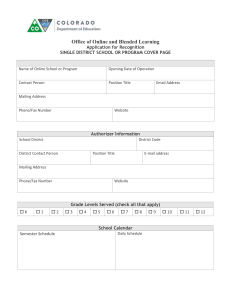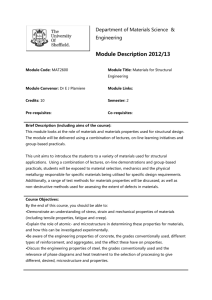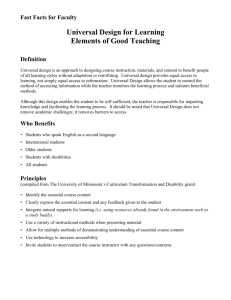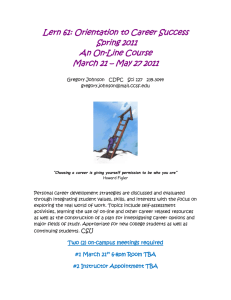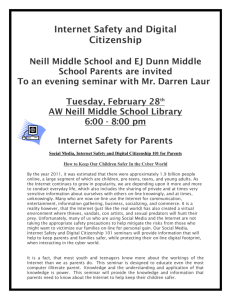Readings - the Sociology Department at CU
advertisement
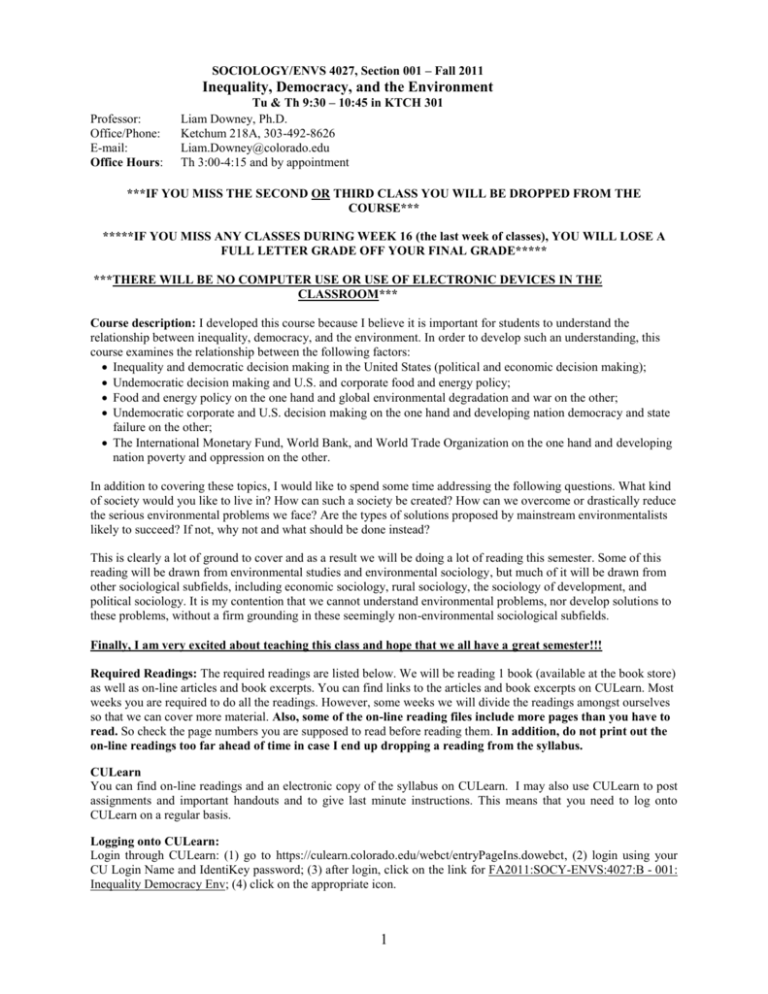
SOCIOLOGY/ENVS 4027, Section 001 – Fall 2011 Inequality, Democracy, and the Environment Professor: Office/Phone: E-mail: Office Hours: Tu & Th 9:30 – 10:45 in KTCH 301 Liam Downey, Ph.D. Ketchum 218A, 303-492-8626 Liam.Downey@colorado.edu Th 3:00-4:15 and by appointment ***IF YOU MISS THE SECOND OR THIRD CLASS YOU WILL BE DROPPED FROM THE COURSE*** *****IF YOU MISS ANY CLASSES DURING WEEK 16 (the last week of classes), YOU WILL LOSE A FULL LETTER GRADE OFF YOUR FINAL GRADE***** ***THERE WILL BE NO COMPUTER USE OR USE OF ELECTRONIC DEVICES IN THE CLASSROOM*** Course description: I developed this course because I believe it is important for students to understand the relationship between inequality, democracy, and the environment. In order to develop such an understanding, this course examines the relationship between the following factors: Inequality and democratic decision making in the United States (political and economic decision making); Undemocratic decision making and U.S. and corporate food and energy policy; Food and energy policy on the one hand and global environmental degradation and war on the other; Undemocratic corporate and U.S. decision making on the one hand and developing nation democracy and state failure on the other; The International Monetary Fund, World Bank, and World Trade Organization on the one hand and developing nation poverty and oppression on the other. In addition to covering these topics, I would like to spend some time addressing the following questions. What kind of society would you like to live in? How can such a society be created? How can we overcome or drastically reduce the serious environmental problems we face? Are the types of solutions proposed by mainstream environmentalists likely to succeed? If not, why not and what should be done instead? This is clearly a lot of ground to cover and as a result we will be doing a lot of reading this semester. Some of this reading will be drawn from environmental studies and environmental sociology, but much of it will be drawn from other sociological subfields, including economic sociology, rural sociology, the sociology of development, and political sociology. It is my contention that we cannot understand environmental problems, nor develop solutions to these problems, without a firm grounding in these seemingly non-environmental sociological subfields. Finally, I am very excited about teaching this class and hope that we all have a great semester!!! Required Readings: The required readings are listed below. We will be reading 1 book (available at the book store) as well as on-line articles and book excerpts. You can find links to the articles and book excerpts on CULearn. Most weeks you are required to do all the readings. However, some weeks we will divide the readings amongst ourselves so that we can cover more material. Also, some of the on-line reading files include more pages than you have to read. So check the page numbers you are supposed to read before reading them. In addition, do not print out the on-line readings too far ahead of time in case I end up dropping a reading from the syllabus. CULearn You can find on-line readings and an electronic copy of the syllabus on CULearn. I may also use CULearn to post assignments and important handouts and to give last minute instructions. This means that you need to log onto CULearn on a regular basis. Logging onto CULearn: Login through CULearn: (1) go to https://culearn.colorado.edu/webct/entryPageIns.dowebct, (2) login using your CU Login Name and IdentiKey password; (3) after login, click on the link for FA2011:SOCY-ENVS:4027:B - 001: Inequality Democracy Env; (4) click on the appropriate icon. 1 Adobe Acrobat: In order to read most of the on-line readings, you need to have Adobe Acrobat installed on your computer. If it is not installed, you can download it from: http://www.adobe.com/products/acrobat/readstep2.html You have to purchase the following book at the UMC bookstore! Klare, Michael T. 2004. Blood and Oil: The Dangers and Consequences of America’s Growing Dependency on Imported Petroleum. New York: Metropolitan Books. The following book can be found on-line at: http://www.natcap.org/sitepages/pid20.php Hawken, Paul, Amory Lovins, and L. Hunter Lovins. 1999. Natural Capitalism: Creating the Next Industrial Revolution. New York: Back Bay Books. After you get to the ‘Natural Capitalism’ website, click on the phrase ‘more info’ that is associated with the chapter you want to read. Then, on the new web page, click on the ‘download the entire chapter’ link. The chapter will download for you. You can then save it to a disk or to your computer by clicking on the ‘save a copy’ icon. Download and save the appropriate chapters immediately!!! Your grade in this course will be based upon the following assignments (and attendance): Due Date Points Toward Final Grade 1. 2 reading summaries Summary 1 Summary 2 Oct. 27 Nov. 15 3 points 3 points 2. 4 take home exams Exam 1 Exam 2 Exam 3 Exam 4 Sept. 20 Oct. 18 Nov. 10 Dec. 8 18 points 22 points 22 points 22 points 3. Attendance 10 points 100 points 90-100 points = A- to A 80 - 90 points = B- to B+ 70 - 80 points = C- to C+ 60 - 70 points = D- to D+ 0 - 60 points = F ATTENDANCE POLICY: You will not do well in this course if you do not attend class and do the reading. In order to ensure attendance, I will take attendance every day. Attendance is worth 10% of your grade. HOWEVER, IF YOU MISS MORE THAN 6 CLASSES YOU WILL FAIL THE COURSE!!! In addition, (a) if you miss the second OR third class of the semester you will be dropped from the course and (b) if you miss any classes during week 16 (the last week of classes), you will lose a full letter grade off your final grade in addition to any other penalty you will receive for missing class. I WILL NOT NEGOTIATE GRADES ****All assignments MUST be turned in to me in class at the beginning of the class for which they are due**** Reading Summaries: For Oct. 27 and Nov. 15, the class will be divided up into 5 reading groups. Each group will read one of the five sets of readings listed for that week and give a 5-7 minute report to the class on it. In order to help you prepare for the 2 reports, I am going to ask each of you to write a 1-2 page summary of your readings for that class. The report to the class will not be graded, so it does not need to be formal. Instead, you will spend a few minutes at the beginning of class deciding who will discuss the reading and what is most important in it. Your summaries will be graded, however. So do a good job on them. 6 points may not seem like a lot, but it is half a letter grade, and can mean the difference, for example, between a B+ and an A- or a B+ and a B-. 2 The exams: We are covering a lot of material this semester. So instead of asking you to take 2 or 3 big, in-class exams where you would have to remember 6-8 weeks’ worth of material, I am going to have you take 4 take-home exams. In these exams, I will ask you to answer several questions about the readings, lectures, and class discussions during the 3-4 weeks prior to the exam. For each exam, your answers should collectively add up to 5-7 pages (typed and double spaced). The reading summaries and exams must be printed on a computer (or typed) using one-inch margins at the top and bottom and 1.25-inch margins on the left and right. They must be double-spaced, using a 12point Times New Roman font. All written work must be original. In other words, do not use somebody else’s ideas without properly citing the source of those ideas (your references must be listed on a separate sheet). Keep direct quotes to an absolute minimum, but clearly cite direct quotes when you use them. Remember, plagiarism is a serious offense that can result in you failing the class. Class Participation: You will not be graded on class participation. However, students tend to learn more when they participate in class discussions and when they ask questions about material that they find interesting or difficult to understand. Do not hesitate to ask questions in class. If you do not ask questions about the course material, I will assume you understand it. If you miss a class it is your responsibility to get lecture and discussion notes, as well as other course information, from another student. If you still have questions after talking with another student, please contact me. Your grades will be based on your mastery of the course material as indicated by the substantive quality of your work. Work has to be handed in to me in person, in class, and on time. ***I will not accept late summaries or exams*** ***There will be no make-up exams*** The only times I will make exceptions to my late assignment, exam, and attendance policies are if you provide me with written proof of a death in your family, a medical emergency, a court date, a religious conflict, or your participation in a university-supported activity. ______________________________________________________________________________________ Weekly Topics and Readings Week 1: Environmental Degradation Readings: Aug. 23: No Reading Aug. 25: On-line: Speth, pages (pp.) 13-36 and 43-62 Week 2: Inequality / Natural Capitalism Readings: Aug. 30: On-line: Hawken et al. pp. 144-159, 190-198 http://www.natcap.org/sitepages/pid20.php On-line: Kerbo, pp. 18-49 & 569-576 On-line: Anderson and Cavanagh, Read the key findings and tables only On-line: The Kassandra Report, Spend 5-10 minutes skimming pp. 54-60. (Optional) On-line UNDHP 2001, pp. 9-16 and On-line UNHDP 1997, pp. 15-18 Sept. 1: On-line: Hawken et al., pp. 1-11, 22-29, 48-61 http://www.natcap.org/sitepages/pid20.php Week 3: Natural Capitalism and Ecological Economics Readings: Sept. 6: On-line: Cobb et al. On-line: Boyce, pp. 1-11 Sept. 8: On-line: Hawken et al., pp. 62-73, 82-94, 159-169 http://www.natcap.org/sitepages/pid20.php 3 Week 4: Democracy and the Media Readings: Sept. 13: On-line: Pateman, pp. 1-5, 22-27, 42-43 On-line: Croteau & Hoynes, pp. 7-26 Sept. 15: On-line: Croteau & Hoynes, pp. 26-37 (optional) On-line: Hoynes, pp. 34-54 Week 5: Democracy and the Media / Economic and Political Sociology Readings: Sept. 20: Exam 1 Due Sept. 22: On-line: Domhoff 1 (Who Rules America?) On-line: Neubeck, pp. 334-337 (Optional) On-line Sunstein, pp. 17-25 and Roosevelt’s Second Bill of Rights Week 6: Economic and Political Sociology Readings: Sept. 27: On-line: Domhoff 2 (Power Elite, pp. 20-24, 37-40, 257-264) Sept. 29: On-line: Domhoff 3 (Power Elite, pp. 107-125, 144-147) Week7: Globalization, the World Bank, and the IMF Readings: Oct. 4: On-line: Bello 1990a, pp. 7-9, 18-35 On-line: Handout on the World Bank, the IMF, and the WTO Oct. 6: On-line: Bello 1990b, pp. 51-71 Week 8: Globalization, the IMF, and the WTO Readings: Oct. 11: On-line: Stiglitz 2003a, pp. ix-xvi, 3-22 Oct. 13: On-line: Stiglitz 2003b, pp. 53-67, 73-75 On-line: What is the WTO (According to the WTO)? (Read, but do not print) (Optional) On-line: Wallach 2004a, pp. 239-253 Week 9: The WTO, NAFTA, and Property Rights Readings: Oct. 18: Exam 2 Due Oct. 20: On-line: Wallach 2004b, pp. 19-22, 25-26, 36-39, 41-47 On-line: Greider 2001b (The Right and U.S. Trade Law) Week 10: Agriculture 1 Readings: Oct. 25: On-line: Greider 2001a (Sovereign Corporations) On-line: Barlow On-line: Finnegan (Read the first page and first paragraph of second page only) On-line: Seized! (Optional) On-line: Shiva & Holla-Bhar Oct. 27: Reading Summary 1 Due: The class will be divided up into five reading groups. Each group will read one of the following readings and give a 5-7 minute report to the class on it. On-line: Silverstein On-line: Schlosser, pp. 42-57 On-line: Schlosser, chapter 5 On-line: Schlosser, chapter 6 On-line: Schlosser, chapter 9 4 Week 11: Agriculture 2 Readings: Nov. 1: On-line: Heffernan et al., pp. 1-7 plus fact sheets and tables at end of the report On-line: Hendrickson et al., Executive summary and pp. 1-6 Nov. 3: On-line: Cook, pp. 12-16 & 20-22 On-line: Wallach, pp. 189-198, 204-5, 208-211 Week 12: Biotechnology Readings: Nov. 8: On-line: Smith, pp. 127-157 (Optional) On-line: Commoner Nov. 10: Exam 3 Due Week 13: War and Oil Readings: Nov. 15: Reading Summary 2 Due: The class will be divided up into five reading groups. Each group will read one of the following readings and give a 5-7 minute report to the class on it. On-line: Island Press On-line: Johnson, pp. 34-36 & 43-53 On-line: Bivens On-line: Clark, pp. 59-69 On-line: Clark, pp. 94-108 Nov. 17: Klare (from the book you purchased), Preface and chapter 1 Week 14: NO CLASSES, THANKSGIVING BREAK! Week 15: Oil, Natural Resources, and War Readings (from the book you purchased): Nov. 29: Klare, Chapters 2 & 3 Dec. 1: Klare, Chapter 4 & pp. 180-187 Week 16: Social, Political and Economic Change Readings: Dec. 6: On-line: Resource Wars, pp. 190-226 Dec. 8: Exam 4 Due 5 University Policies ACCOMODATION: Disability, Religious & Activity Accommodations: 1. If you qualify for an accommodation due to a disability, please submit to the instructor a letter from Disability Services that details the appropriate accommodations by the end of the second week of class. Disability Services determines accommodations based upon documented disabilities. For more information call 303-492-8671, visit their office at N200 Center for Community, or go to their website http://www.colorado.edu/disabilityservices. 2. Campus policy regarding religious observances requires that faculty make every effort to reasonably and fairly deal with all students who, because of religious obligations, have conflicts with scheduled exams, assignments or required attendance. If the observance of a religious holiday or activity conflicts with the course requirements, please make the dates of the conflict(s) known to the instructor in writing by the end of the second week of class. http://www.colorado.edu/policies/fac_relig.html 3. If participation in a university-supported activity (athletic competitions, artistic performances, etc.) conflicts with the course requirements, please make the dates and nature of the conflicts known to the instructor in writing by the end of the second week of class. Students will be asked to provide evidence of participation for any exceptions. HONOR CODE: All students of the University of Colorado at Boulder are responsible for knowing and adhering to the academic integrity policy of this institution. Violations of this policy may include: cheating, plagiarism, aid of academic dishonesty, fabrication, lying, bribery, and threatening behavior. All incidents of academic misconduct shall be reported to the Honor Code Council (honor@colorado.edu; 303-725-2273). Students who are found to be in violation of the academic integrity policy will be subject to both academic sanctions from the faculty member and non-academic sanctions (including but not limited to university probation, suspension, or expulsion). Other information on the Honor Code can be found at http://www.colorado.edu/policies/honor.html and at http://www.colorado.edu/academics/honorcode/ LEARNING ENVIRONMENT: Students and faculty each have responsibility for maintaining an appropriate learning environment. Students who fail to adhere to behavioral standards may be subject to discipline. See polices at http://www.colorado.edu/policies/classbehavior.html and at http://www.colorado.edu/studentaffairs/judicialaffairs/code.html#student SEXUAL HARRASSMENT: The University of Colorado Policy on Sexual Harassment applies to all students, staff and faculty. Sexual harassment is unwelcome sexual attention. It can involve intimidation, threats, coercion, or promises that create an environment that is hostile or offensive. Harassment may occur between members of the same or opposite gender and between any combination of members in the campus community: students, faculty, staff, and administrators. Harassment can occur anywhere on campus, including the classroom, the workplace, or a residence hall. Any student, staff or faculty member who believes s/he has been sexually harassed should contact the Office of Sexual Harassment (OSH) at 303-492-2127 or the Office of Judicial Affairs at 303-492-5550. Information about the OSH and the campus resources available to assist individuals who believe they have been sexually harassed can be obtained at http://www.colorado.edu/odh/ 6 Professor Downey’s Expectations 1. Come to class every day. 2. Come to class on time every day. 3. If you do arrive late, come in quietly and find a seat near the door. 4. Don’t leave the room in the middle of class to go to the bathroom or for any other reason. 5. If you absolutely have to leave class early (for a doctor’s appointment for example): a. Tell me before class b. Sit near the door 6. No talking, reading, playing on a computer, surfing the web, etc., or sleeping in class. 7. Stop talking and reading as soon as class begins. 8. Class begins on time. 9. Do not start to pack your things before class ends. 10. Take complete and thorough lecture notes. 11. If you miss class, get lecture notes from another student (then talk to me if you do not understand the notes). 12. Treat everyone in the room with respect. 13. Participate in class discussions. 14. DO ALL THE ASSIGNED READINGS BEFORE THE CLASS ON WHICH THEY ARE DUE. 7

